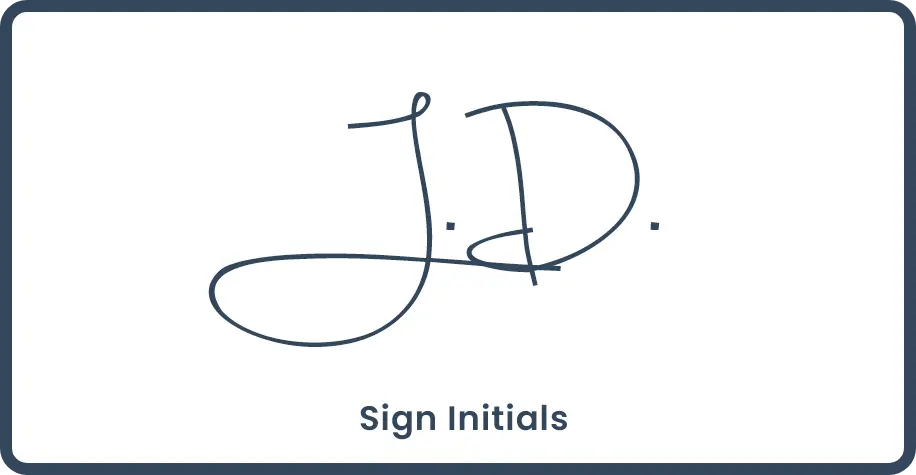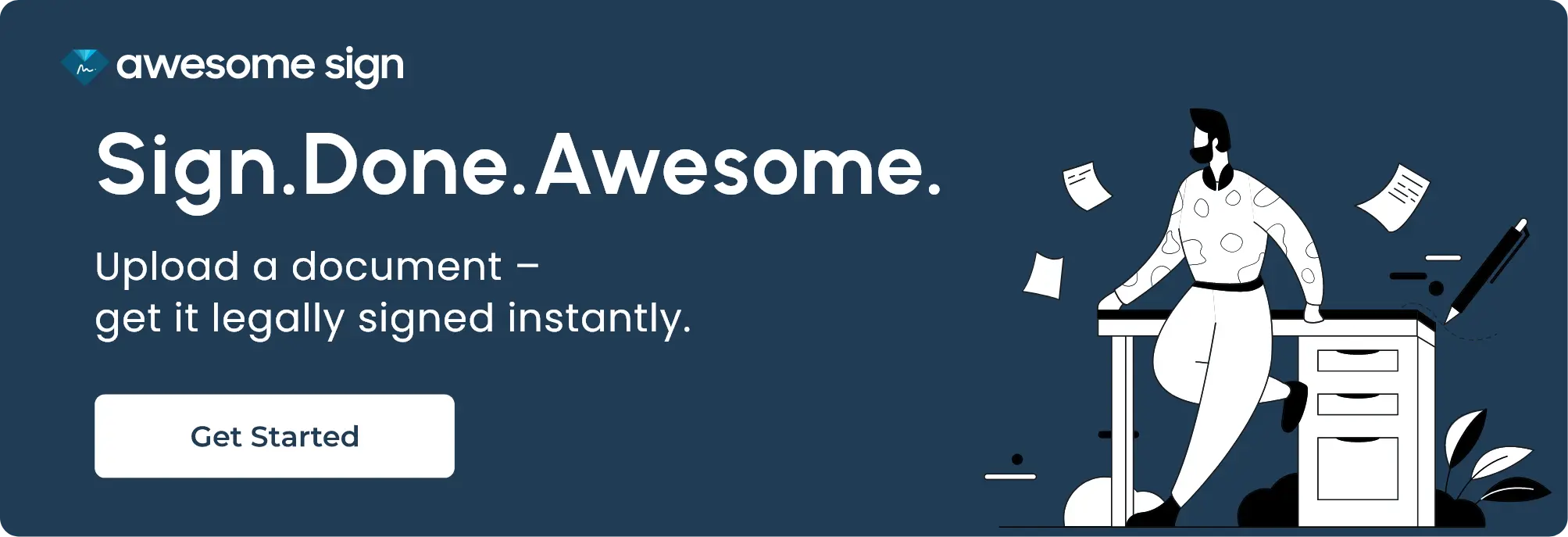Table of content :
What does initialing a contract mean?
Do I need to initial each page of my contract for it to be legally binding?
The legality of digital contracts and e-signatures
E-signatures legality in the US
E-signatures legality in India
The pros and cons of writing your initials in a contract
Pros of Initials in a Contract:
Initialing a contract: are they useful?
Awesome Sign
Published on:
February 1 , 2022
·10 min read

If you've ever had the pleasure (if we're being honest, the displeasure) of signing a legally binding contract, you'll most likely know what initialing a contract means. It could be anything as simple as an employment contract or a long-winded property contract. Signing documents by hand tends to take longer than necessary. Add initialing each page, and you'll find yourself stuck with a contract for a good part of your day.
This is why several organizations have switched to e-signing lengthy contracts. Research by Forrester has found that e-signatures have resulted in
- An 85 percent increase in productivity, and
- helped save 22,000 staff hours per year.
E-signature software has changed signing documents and legal contracts for the better. But what exactly does initialing a contract mean? Why do we add our initials to each page? And how does e-signing software make it easier?
What does initialing a contract mean?

Before we get into initialing a contract, let's understand what initials mean legally.
When it is a Noun, the word "initials" refers to:
"The first letter of a name or word, typically a person's given name or a word, forming part of a phrase."
As a Verb, i.e., "initialing" on the other hand it means:
"Mark or sign (a document) with one's initials in order to authorize or validate it."
In basic terms, initialing a contract refers to writing your initials on each page of the same.
Initials in contract example:

For example, if your name is John Doe, you would write the initials "J.D." on each page. These initials are essential to the credibility of legal contracts and documents. Generally, you must add your initials on each page for the following reasons:
- Proof of consent- adding your initials to each page shows that you consent to all the terms and conditions of the contract.
- Proof that no extra pages are added to the contract. This prevents any chances of being tricked into something you don't accept.
- Proof that you have read all terms and conditions of the contract. Several signatories tend to skim through contracts without care or caution. Initialing each page ensures that they at least try to read the document or show proof that they have read each page.
- Lastly, we add initials to each page to protect the integrity of the signatory and the contractor.
The debate about the necessity of initialing a contract is never-ending. Several contractors do not ask signatories to initial contracts as it is not legally necessary. But others instruct signatories to do so as a precautionary step while signing contracts. Contract initialing's use truly comes into question with the digitalization of the signing process.
During the forecast period 2021-2026, the e-signatures market is set to grow at a CAGR of 28.1 percent. Traditional signatures are being phased out, in favor of digital signatures. E-signatures also minimize the possibility of legal conflicts and offer better proof of consent. Most e-signature tools do not offer initialing options for similar reasons. There is no need to add initials as proof of consent is clear, the integrity of the signatory is solid and it typically adds no value to the contract.
But company policy often calls for contract initialing, especially for HR and Accounting purposes. They don't do this to irritate new joiners with endless paperwork, but to ensure that they carefully read through their contract. This brings us to the question- do we legally need to write our initials on each page of a contract?
Do I need to initial each page of my contract for it to be legally binding?

Initialing your contract on each page is only necessary if your contractor expects it from you. The legality of your contract does not typically require you to sign each page. But initialing your contract also depends on where you reside. If the document is complex and you live in a jurisdiction where they expect you to initial each page you must do so. But the most common reasons to initial a contract in the digital age is for two reasons:
- If it is not feasible to have a contract modified and reprinted before it is signed. Then you must sign each page to ensure that no modifications are made to the document.
- If it is required by law for the contract to be legally binding. These laws depend on which region you reside in. For example, Luxembourg laws state, "Adding initials on every page of a contract is not a legal requirement for a party to express consent. A signature is sufficient to create a valid contract."
Whereas, in France initialing is mandatory for notarized deeds (authentic deeds). It is customary in the United States to initial every page of real estate agreements and estate planning contracts. This is probably because the chances of property disputes years later are quite high.
The issue with contract initialing arises with digital contracts. Most digital contracts are legally binding without any of the long-winded processes of initialing pages. This is why several businesses opt-out of sending documents in their written form. Clients also do not want to waste time initialing every page. Thus lawyers with securities or mergers and acquisition techniques, or other commercial activities with lengthy contracts, rely only on signatures.
So, to put it plainly, we don't need to add our initials to our contracts in the digital age for legal purposes. But if your contractor demands it or your country of residence expects it, you will have to add your initials to each page. Now, if you're still wondering how digital contracts don't require initials per page, we'll get into that in the next section.
The legality of digital contracts and e-signatures
According to Adobe's recent survey on digital documentation and e-signature usage:
- The most commonly e-signed documents in APAC were insurance policies (43%) and healthcare registration(38%).
- In India, business contracts were the most common type of document to be e-signed (77%).
- Legal contracts had the greatest rate of e-signing in Australia (76%).
- The most common documents to sign digitally in Singapore were insurance policies and renewal contracts (81%).
These statistics give us an insight into the digitalization of each region and the increasing legality of e-signatures. Australia, in particular, has a growing number of legal professionals who have completely switched to digital documentation. Several countries have taken steps towards digitizing their documentation processes to reduce paper trails and the time taken to sign documents.

Digital signatures are legally binding in most countries. For example, the European Union allows e-signatures in legal contracts as long as they fall under the Qualified Electronic Signature category. Using a qualified electronic signature creation device(QESCD), the Qualified Electronic Signature is created. Since they are created after receiving certification from authorities, qualified electronic signatures are legally binding.
Related Topics:
E-signatures legality in the US
In the US, the ESIGN Act was passed by Congress in the year 2000. If all parties to a contract choose to utilize electronic documents and sign them electronically, it renders legal recognition to electronic signatures and records. The UETA and the ESIGN Act strengthened the legal system for the use of electronic contracts and e-signatures in business. They did so by establishing that electronic documents and signatures maintain the same weight and offer the same legal impact as traditional written records and handwritten signatures. Both Acts state the following:
- No contract, signature, or record shall be denied legal effect solely because it is in electronic form.
- A contract relating to a transaction cannot be denied legal effect solely because an electronic signature was used in its formation.
So, we can be assured of the fact that e-signed contracts are legally binding in the US. But what about nations that aren't as digitally advanced as the United States or the European nations?
E-signatures legality in India
An example here is India, as it is digitally advancing but has not yet developed to the same extent as the EU or the US. India too has an IT Act that has made electronic signatures legally acceptable under the following conditions:
- The authentication data should only be linked to the person who authenticated it. It must not be shared with anyone else.
- The signatory shall have complete control over the data used to generate the electronic signature at the time of signing.
- It should be identifiable if there is any change in the signature data after it has been attached.
- After the electronic signature, any changes to the information in the document should be traceable.
Therefore you can rest assured that several nations worldwide have taken steps to legalize electronic signatures. So, initialing your documents is not a necessity if it is digital. As all you require is your signature alone to make the contract legally effective.
Now that we've established the legality of electronically signed contracts, we can move on to the next section. If you're still debating between e-signing and initialing each page, let's first weigh out both of their pros and cons.
The pros and cons of writing your initials in a contract

Pros of Initials in a Contract:
- Writing your initials on each page can serve as a steady reminder to read the contract thoroughly.
- If your contractor decides to make any changes, you will know it once you see pages without your initials. It keeps the contractor responsible and ensures that any changes made are clear to you.
- Initials on each page of a document may be helpful in cases of legal disputes. For example, property disputes can be difficult to navigate without clear proof of consent. If the signatory's initials are on each page, the contractor can rest assured that it shows ample evidence of consent.
- Lastly, initialing a contract in no way diminishes the legality of the document. If you want to take extra precautions, there's no need to worry about the legal aspect.
Cons of Initials in a Contract:
- Adding your initials to each page of your contract can be tedious and is unnecessary in the digital age. If you have a contract that spans five pages long, it won't seem like much. But if your contract crosses even 20 pages, be prepared to feel like a tired celebrity once you start signing.
- Writing your initials on each page of a contract is time-consuming. Collecting physical signatures adds an extra day to the workflow of 65 percent of organizations. So, unless you have a lot of time on your hands, e-signing is the way to go.
- Digital signatures are just as valid as handwritten ones in today's times. Once you follow certain procedures set by your country, the legality of it is guaranteed. So adding your initials to each page is not needed for legality. In reality, adding the initials is not necessary even for written contracts. Most firms and businesses agree that the signature is what offers proof of the signatory's consent.
- Paperless contracts are sustainable and easier to document. Every year, the average office worker utilizes 10,000 sheets of copy paper. To manufacture one sheet of paper, you need more than 112 glasses of water. That's roughly 47 gallons of water per ream of paper. So going digital isn't just easier it is also eco-friendly.
- Contracts and other legal documents are much easier to handle digitally. Organizations that use eSignature software can save up to 85% on document handling costs. In financial institutions, eSignature adoption minimizes file loss by up to 60%. And after manual processes are removed, companies see a boost in efficiency by 70% to 80%.
- Lastly, contracts can maintain their integrity for far longer when signed digitally. Written contracts tend to deteriorate over time naturally. Whereas digital contracts are easier to retrieve and store in their original form. Physical contracts need to be scanned, xeroxed, and printed for future use if they deteriorate. Electronically signed contracts are more convenient than written contracts and are accessible globally.
The cons of adding initials to a contract sizeably outweigh its benefits. The rise of electronic signatures and digital contracts offer us many more options to sign our documents. Some e-signature software even offers the option to initial each page using their tools. There are several contract templates available on the market for your use and are highly convenient choices.
Initialing a contract: Key Takeaways
Most organizations have made the shift towards digitizing their documentation processes. Adding your initials to each page of a contract is a thing of the past, and is not a necessity in current times. There are plenty of reasons to choose digital signatures and forgo contract initialing entirely. But the most significant aspects of contract initials are the following:
- If you are extra cautious and prefer being safe and you have a lot of time on your hands, it's completely okay to add your initials to each page. In fact, several real estate contractors will ask for this practice for their company's satisfaction. So, there is no need to stop using initials if you prefer to do so.
- In contrast, if you're short on time and have no reason to add your initials, there is no reason to do so. Unless your contractor specifies this procedure, you do not need to initial your contracts. Adding initials to each page is a painstaking task when the contract is lengthy.
- Companies should start switching to digital signatures if they do not use them already. Paperless businesses reduce processing mistakes by 90 percent on average. And above all, customer experience and satisfaction are much more improved when using e-signatures.
- Lastly, onboarding, hiring, and training processes are much smoother when done digitally. Most new employees are expected to sign several contracts before they officially join your company. The amount of time spent signing documents reduces enormously with the help of electronic signature creators and makers.
In a nutshell, contract initials are fading out of their necessity to most global organizations. But this does not mean that they are completely obsolete as of yet due to the relevance of handwritten contracts. Making the switch to digital is the obvious option out of the two. Though some businesses prefer to do things the traditional way, digitizing documents will soon be the norm worldwide.
If you're looking for e-signature software to help you kickstart your digital documentation journey, try Awesome Sign! You've come to the right place if you're looking for some terrific tools to utilize to e-sign your next document. Awesome Sign is one such tool that lets you skillfully e-sign your documents. Awesome Sign enables you to easily update, sign, and manage your papers from any device. Click here to sign up for a free trial and discover awesome possibilities for signing all of your future contracts.
